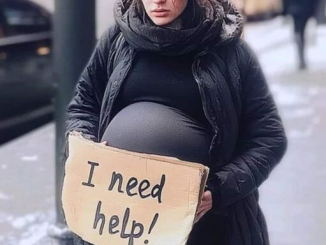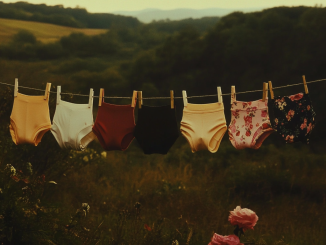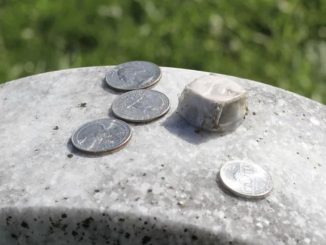What happened to Ann Curry?
The veteran journalist, who celebrates her 67th birthday on November 19, has remained relatively quiet since she was forced out of her job at Today in 2012 and later, NBC News in 2015.
Despite her name no longer appearing in the headlines, Curry continues to work in the field of journalism.
Curry, the eldest of five, was born in Guam to Hiroe Nagase and Robert Paul “Bob” Curry. As a child she spent several years living in Japan before her family moved to Oregon where she attended high school and would later attend and graduate from college.
She began her broadcasting career in 1978 as an intern at KTVL, then an NBC affiliate in Oregon. After succeeding as an intern she was promoted to become the station’s first female news reporter.
Two years into her career she moved to KGW in Portland where she worked as both an anchor and reporter. She later moved to Los Angeles where she worked as a reporter for a CBS affiliate for six years.
During that time she won two Emmy Awards for her work.
Career at NBC News
In 1990, Curry began her career at NBC News.
She began as an NBC News Chicago correspondent before securing a job as an anchor on the now defunct show, NBC News at Sunrise. During her five-year stint as an anchor on the morning show, she also filled in for Today‘s Matt Lauer.
In 1997 she was promoted to news anchor on Today and held the position from 1997 to 2011.
In addition to reading the news on Today, Curry was named co-anchor of Dateline NBC in 2005, and she was the main substitute on NBC Nightly News from 2005 to 2011.

Regardless of her accolades or coverage of hard news stories, in June 2012, Curry found herself out of a job.
Her departure was emotional and public, and it was never very clear the reason behind her leaving Today.
While she no longer sat next to Matt Lauer, she remained with NBC News, but only until January 2015.
Life after NBC News
Following her 25-year career with NBC News, Curry slowed down, but made no less of an impact with her reporting.
She founded a multi-platform media company, reported and produced the PBS series We’ll Meet Again, gave a TED Talk about restoring trust in journalism, and hosted TNT’s Chasing the Cure.

In 2022, Curry received the Murrow Lifetime Achievement Award from Washington State University’s Edward R. Murrow College of Communication. The university recognized her work “on human suffering in war zones and natural disasters through her work as an American journalist, photojournalist, and reporter.”
Most recently, Curry sat down with Min Jin Lee, author of “Pachinko,” for PBS Arts Talk.
And while Curry has kept posting to a bare minimum on social media, after a year and a half absence, she returned to share a wintry photo.
“Good morning world. Keep safe and cozy. ‘The woods are lovely, dark and deep…’” she wrote before disappearing again.
Neighbor Kept Knocking Over My Trash Bins – After 3 HOA Fines, I Taught Him a Lesson in Politeness

When Elise’s trash bins became the target of her bitter neighbor’s antics, she was ready for a fight. But instead of confrontation, she served up banana bread and kindness. What began as a quiet war turned into an unexpected friendship, proving that sometimes, the best revenge is compassion.
When my husband, James, passed away two years ago, I thought I’d weathered the worst storm of my life. Raising three boys, Jason (14), Luke (12), and little Noah (9), on my own wasn’t easy. But we’d eventually found our rhythm.
The house buzzed with the sound of schoolwork being explained, sibling banter, and an endless rotation of chores. We kept the garden alive, argued over who had dish duty, and made a life together that was equal parts chaotic and beautiful.
Things were finally steady. Manageable.
Until the neighbor decided to wage war on my trash bins.
At first, I thought it was the wind or a stray dog. Every trash day, I’d wake up to see the bins overturned, their contents scattered across the street like confetti.
“Bloody hell,” I muttered the next time I saw it. “Not again.”
I’d have no choice but to grab a pair of gloves, a broom, new trash bags, and start cleaning up before the Home Owners Association could swoop in with another fine.
Three fines in two months. The HOA weren’t playing fair. In fact, they’d made it very clear that they weren’t taking my excuses anymore.
But one Tuesday morning, coffee steaming in my hand, I caught him red-handed. From my living room window, I watched as my neighbor, Edwin, a 65-year-old man who lived alone, strolled across the street.
He didn’t even hesitate. With one swift motion, he tipped over my bins and shuffled back to his house like nothing had happened.
My blood boiled.
I was halfway to grabbing my shoes when Noah bounded down the stairs, asking for help with his math homework.
“Mom, please! It’s just two questions. Remember we were talking about it when you were doing dinner last night and we said we’d come back to it but we didn’t,” he rambled.
“Of course, come on,” I said. “I’ll get you some orange juice, and then we can work on that quickly.”
Homework first, trash war later.
The following week, I stood guard.
This time, I was ready.
And sure enough, there he was at 7:04 a.m., knocking the bins down with a strange sort of satisfaction before retreating inside.
That was it. Enough was enough.
I stormed across the street, adrenaline pumping. His porch was stark, no welcome mat, no potted plants, just peeling paint and drawn blinds. I raised my fist to knock, but something stopped me.
The quiet. The stillness of it all.
I hesitated, hand frozen mid-air. What was I even going to say?
“Stop knocking over my bins, you old lunatic?”
Would that even fix anything?
I went home, fuming but thoughtful. What kind of person gets up at the crack of dawn just to mess with their neighbor?
Someone angry. Someone lonely. Someone in pain, maybe?
“You’re just going to let him get away with it?” Jason asked that night, arms crossed and clearly ready to fight for me. “He’s walking all over us, Mom.”
“I’m not letting him get away with anything, love,” I replied, tapping the side of the mixing bowl as I stirred. “I’m showing him that there’s a better way.”
“And when baked goods don’t work, Mom?” Jason asked, eyeing the banana bread batter in the bowl.
“Then, my little love, I’ll set you on him. Do we have a deal?”
My son grinned and then nodded.
But it was during dinner prep, while I was putting together a lasagna, that I thought… instead of fighting fire with fire, what if I fought with something… unexpected?
The next week, I didn’t stand guard.
Instead, I baked.
Banana bread first, specifically James’ favorite recipe. The smell brought back memories I hadn’t let myself linger on in a long time. I wrapped the loaf in foil, tied it with a piece of twine, and left it on Edwin’s porch.
No note, no explanation. Just bread.
For a few days, the banana bread sat untouched on his porch. The bins stayed upright, but I still wasn’t sure what was going through his head.
The next morning, the foil-wrapped loaf was gone. A good sign, maybe.
Emboldened, I doubled down.
A casserole followed the banana bread. Then a bowl of chicken noodle soup.
Days turned into weeks, and not once did I see him open the door or acknowledge the food. But he didn’t tip the bins again, either.
“Mom, you’re going soft,” Jason said one evening, eyeing the plate of cookies I was about to deliver.
“No, I’m not,” I replied, slipping on my sneakers. “I’m being strategic.”
The cookies did the trick. That Saturday, as I placed them on the porch, the door creaked open.
“What do you want?” he asked.
I turned to find him peering out, his face lined with age and what looked like years of solitude. He didn’t look angry. Just… tired.
“I made too many cookies,” I said, holding up the plate like a peace offering.
He stared at me for a long moment, then sighed.
“Fine. Come in.”
The inside of his house was dim but surprisingly tidy. Bookshelves lined every wall, stacked high with novels, photo albums, and other trinkets. He motioned for me to sit on the worn sofa, and after a moment of awkward silence, he spoke.
“My wife passed four years ago,” he began, his voice halting. “Cancer. After that, my kids… well, they moved on with their lives. Haven’t seen much of them since.”
I nodded, letting him take his time.
“I’d see you with your boys,” he continued. “Laughing, helping each other. It… hurt. Made me angry, even though it wasn’t your fault. Tipping the bins was stupid, I know. I just didn’t know what to do with it all.”
“You don’t just walk over to your neighbors and tell them you’re miserable,” he said, shaking his head. “That’s not how I was raised. You bottle it up and deal with it.”
His voice cracked on the last word, and I felt my frustration melt away. This wasn’t about trash bins. It was about grief. About loneliness.
“I’m sorry,” he said, his head bowed.
“I forgive you,” I replied, meaning every word.
“I don’t even know your name,” he said.
“Elise,” I said. “And I know you’re Edwin. My husband mentioned you once or twice.”
Then, I invited him to join my Saturday book club at the library. He looked at me like I’d suggested he jump off a bridge.
“Book club? With strangers!”
“They’re not strangers,” I said. “Not really. They’re neighbors. Friends you haven’t met yet.”
It took some convincing, but the following Saturday, Edwin shuffled into the library, hands stuffed in his pockets. He didn’t say much that first meeting, but he listened.
By the third, he was recommending novels and trading jokes with the other members.
The real turning point came when one of the ladies, Victoria, a spry widow in her seventies, invited him to her weekly bridge game. He accepted.
From then on, he wasn’t just my cranky neighbor. He was Edwin, the guy who brought homemade scones to book club and always had a dry one-liner up his sleeve.
The bins stayed upright. The HOA fines stopped.
And Edwin? He wasn’t alone anymore.
One evening, as I watched him laughing with Victoria and the other bridge players on her porch, Jason came up beside me.
“Guess you weren’t soft after all,” he said, grinning.
“No,” I said, smiling as I ruffled his hair. “Sometimes, the best revenge is just a little kindness.”
And in that moment, I realized something: We weren’t just helping Edwin heal. He was helping us, too.
The first time Edwin came over for dinner, he looked like he didn’t know what to do with himself. He showed up holding a bottle of sparkling cider like it was a rare treasure. His shirt was freshly ironed, but he still tugged at the collar as if it might strangle him at any moment.
“You didn’t have to bring anything,” I said warmly.
He shrugged, his lips twitching into something that resembled a smile.
“Didn’t want to come empty-handed, Elise,” he said. “It’s polite.”
The boys were setting the table, Noah carefully placing forks, Luke arranging the glasses, and Jason lighting a candle in the center. They glanced at Edwin curiously, a little wary.
Dinner was simple but comforting: roast chicken, mashed potatoes, and honey-glazed carrots, with a loaf of crusty bread and gravy on the side. It wasn’t fancy, but it was one of James’ favorite meals. It was something that always brought warmth to the table, no matter how chaotic the day had been.
“Smells good in here,” Edwin said as he sat down, his eyes darting around like he was trying to take in every detail of the room.
“Mom’s chicken is famous in our family,” Noah piped up proudly, scooping a mountain of mashed potatoes onto his plate. “She makes it the best.”
“High praise,” Edwin said, glancing at me.
We all settled in, and for a while, the only sound was the clink of forks and knives against plates. But soon, the boys started peppering Edwin with questions.
“Do you like chicken or steak better?” Luke asked.
“Chicken,” Edwin replied after a moment of thought. “But only if it’s cooked as well as this.”
Noah giggled.
“What’s your favorite book? Mom says you like to read a lot.”
“That’s a tough one,” Edwin said, rubbing his chin. “Maybe To Kill a Mockingbird. Or Moby Dick.”
Jason, always the skeptic, raised an eyebrow.
“You actually finished Moby Dick?”
That made Edwin laugh, a deep, hearty sound that seemed to surprise even him.
“I won’t lie. It took me a year.”
By dessert, apple pie with a scoop of vanilla ice cream, Edwin had relaxed completely. The boys were swapping stories about school, and he was chuckling along, even teasing Jason about his upcoming math test.
As I cleared the plates, I glanced over to see Edwin helping Noah cut his pie into bite-sized pieces, patiently showing him the best way to balance the ice cream on the fork. It was such a tender moment, and my heart squeezed a little.
When dinner was over and the boys ran off to finish homework, Edwin lingered in the kitchen, drying dishes as I washed them.
“You have a good family,” he said softly.
“Thank you,” I replied, handing him a plate to dry. “And you’re welcome here anytime. You know that, right?”
He nodded, his throat bobbing as he swallowed.
“I do now.”



Leave a Reply